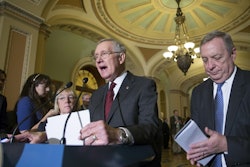PARIS (AP) — Drugmaker Sanofi Pasteur said Tuesday it is launching an effort to research and develop a vaccine to prevent the Zika virus, after the World Health Organization declared a global emergency over its explosive spread across the Americas.
There is no treatment or vaccine for the mosquito-borne virus, which has been linked to birth defects and is in the same family of viruses as dengue. Sanofi made the first dengue vaccine shot, licensed last year in Brazil after years of scientific struggle to develop one.
Sanofi's Dr. Nicholas Jackson, who is leading the company's Zika effort, said it will leverage experience with the dengue vaccine, yellow fever and Japanese encephalitis. It hopes existing manufacturing capabilities, technology and ongoing studies in 10 countries on the dengue virus will also help speed up the search.
Vaccine development typically takes years. Jackson, head of global research for Sanofi Pasteur, said the company wants to "greatly accelerate" the hunt for a vaccine but that Brazilian predictions of a version within three to five years sound "ambitious."
"It's very difficult to predict a reliable timeline ... given that we're learning so much about the disease and what we need to do," he told The Associated Press.
The U.S. government announced last week that it is beginning research into a possible vaccine. Dr. Anthony Fauci of the National Institutes of Health said there are vaccines in various stages of development for other viruses in the same family — dengue, West Nile and chikungunya — that offer a pattern for creating something similar against Zika.
Sanofi Pasteur, a unit of Sanofi SA, said it is in informal discussions with the WHO and Brazilian authorities. "Collaboration is absolutely essential to understand this frightening disease."
The Zika virus was long thought to be relatively benign, with generally milder symptoms than dengue. But amid a large recent Zika outbreak in Brazil, researchers began reporting an increase in a rare birth defect named microcephaly, in which babies are born with abnormally small heads.
The WHO on Monday called it an "extraordinary event" that poses a public health threat to other parts of the world, declaring a global health emergency despite a lack of definitive evidence proving the virus is causing birth defects.
Sanofi plans to "rush through" a series of vaccine candidates, including that used for dengue, Jackson said. He said he hopes that the company learned enough during its 20-year, $1 billion search for a dengue vaccine to rule out some ideas that turned out to be ineffective.
Clinical trials for the zika vaccine, however, would be particularly difficult as they might involve testing in women of child-bearing age and pregnant women, groups that scientists have traditionally been loathe to put at risk.
With France's medical community reeling after a man died during clinical trials of a painkiller last month, Jackson insisted that "we would never compromise safety" amid the speeded-up effort for a Zika vaccine.
He said he hopes an eventual vaccine would be available to all populations, but especially to adolescent girls before they begin sexual activity, because of concerns about possible birth defects. He said it was too early to say whether it would be used to vaccinate pregnant women.






















